Phyllis McGinley (1905–1978) was a victim of cancel culture long before that idea existed.
After she won the 1961 Pulitzer for her poetry—the first American poet ever to be so honored for light verse—W.D. Snodgrass, who was awarded the Pulitzer the previous year, commented that this “was horrifying; she used to write silly little verses for The Saturday Evening Post.”






